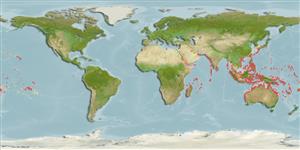>
Blenniiformes (Blennies) >
Blenniidae (Combtooth blennies) > Blenniinae
Etymology: Aspidontus: Greek, aspis, -idos = shield + Latin, dens, dentis = teeth (Ref. 45335).
Eponymy: Jean-Jacques Dussumier (1792–1883) was a French merchant, collector, traveller and ship owner. [...] (Ref. 128868), visit book page.
More on author: Valenciennes.
Environment: milieu / climate zone / depth range / distribution range
Ökologie
seewasser riff-verbunden; tiefenbereich 1 - 20 m (Ref. 90102). Tropical; 32°N - 32°S
Indo-Pacific: Red Sea south to Knysna, South Africa (Ref. 4404) and east to Tuamoto Islands, north to southern Japan, south to northern New South Wales; Palau to eastern Caroline Islands, Marshall Islands in Micronesia.
Size / Gewicht / Alter
Maturity: Lm ? range ? - ? cm
Max length : 12.0 cm TL Männchen/unbestimmt; (Ref. 9710)
Rückenflossenstacheln (insgesamt) : 9 - 11; Rückenflossenweichstrahlen (insgesamt) : 28 - 34; Afterflossenstacheln: 2; Afterflossenweichstrahlen: 25 - 30. A. dussumieri differs from the A. taeniatus taeniatus by having a nearly terminal mouth and different color pattern, sometimes with elongate ocellus in front of dorsal fin (Ref. 37816). Indonesian populations have long yellow filaments on caudal fin. Recognized by the slender body and single dark mid-lateral stripe from the tip of the snout to the caudal fin (Ref. 48636).
Common in coral reefs and rocky areas (Ref. 559, 637). Feed on algae and detritus. Generally a shy species that quickly retreats to its hiding holes, usually empty tube-worm homes, retreating backwards (Ref. 48636). Oviparous. Eggs are demersal and adhesive (Ref. 205), and are attached to the substrate via a filamentous, adhesive pad or pedestal (Ref. 94114). Larvae are planktonic, often found in shallow, coastal waters (Ref. 94114).
Life cycle and mating behavior
Geschlechtsreife | Fortpflanzung | Ablaichen | Eier | Fecundity | Larven
Distinct pairing (Ref. 205).
Myers, R.F., 1991. Micronesian reef fishes. Second Ed. Coral Graphics, Barrigada, Guam. 298 p. (Ref. 1602)
IUCN Rote Liste Status (Ref. 130435: Version 2024-1)
Bedrohung für Menschen
Harmless
Nutzung durch Menschen
Fischereien: kommerziell; Aquarium: Kommerziell
Tools
Zusatzinformationen
Download XML
Internet Quellen
Estimates based on models
Preferred temperature (Ref.
123201): 24.7 - 29.3, mean 28.4 °C (based on 3320 cells).
Phylogenetic diversity index (Ref.
82804): PD
50 = 0.6250 [Uniqueness, from 0.5 = low to 2.0 = high].
Bayesian length-weight: a=0.00575 (0.00253 - 0.01308), b=3.06 (2.86 - 3.26), in cm total length, based on LWR estimates for this (Sub)family-body shape (Ref.
93245).
Trophic level (Ref.
69278): 2.0 ±0.00 se; based on food items.
Widerstandsfähigkeit (Ref.
120179): hoch, Verdopplung der Population dauert weniger als 15 Monate. (Preliminary K or Fecundity.).
Fishing Vulnerability (Ref.
59153): Low vulnerability (10 of 100).
Nutrients (Ref.
124155): Calcium = 136 [66, 232] mg/100g; Iron = 0.803 [0.459, 1.410] mg/100g; Protein = 17.9 [16.7, 19.0] %; Omega3 = 0.0825 [, ] g/100g; Selenium = 25.9 [12.3, 58.3] μg/100g; VitaminA = 103 [25, 429] μg/100g; Zinc = 2.43 [1.59, 3.51] mg/100g (wet weight);
